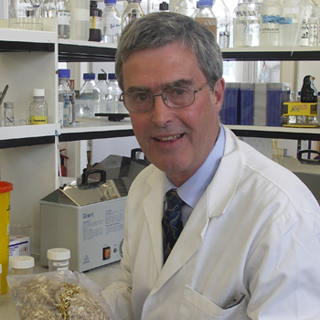
New European study to investigate methane production in livestock
The new, collaborative, large-scale project named ‘Ruminomics’ has been commissioned under the European Commission’s 7th Framework Programme: Food, Agriculture, Fisheries and Biotechnology.
The € 7.7 million, four-year project is a partnership between 11 European organisations, and will be coordinated by Professor John Wallace of the Rowett Institute of Nutrition and Health at the University of Aberdeen in Scotland, UK.
The demand for livestock products is growing, and the health of the farming industry is vital to the sustainability of rural communities. Farm animals are however significant contributors to the emission of the ‘greenhouse gas’ methane, but there is still much uncertainty around how this happens.
Methane is produced by ruminant animals, such as cows, as an end product of the digestion of forages and concentrate feeds by microbes within the animal’s rumen (stomach). Ruminants also use feed protein inefficiently, leading to both pollution and to further greenhouse gas production.
Therefore technologies that will lower these methane emissions - and improve the efficiency of feed - will form a key strategy in mitigating the environmental impact of the farming of ruminant livestock.
Professor Wallace explains the aims of the collaboration as follows: “Ruminomics aims to increase the efficiency - and decrease the environmental footprint - of the farming of ruminant livestock, and to significantly advance current knowledge in this sector.
“The project will exploit state-of-the-art technologies to understand how ruminant gastrointestinal microbial ecosystems - called microbiomes - are controlled by the host animal, and by their diet, and how this impacts on greenhouse gas emissions, efficiency and product quality.
“Our aim with this ambitious project is to develop new models and tools to enable the livestock industry to reduce environmental impact from methane and nitrogen emissions, and to improve the nutritional efficiency of the feeds they are using.”
The Ruminomics research programme will include:
A large-scale genetic study involving 1,000 dairy cows, to relate feed intake, digestion efficiency, milk production/composition and methane emissions to the ruminal microbiome and the host genome, leading to new indicators and tools for genetic selection.
Cow-reindeer studies to investigate how host species influence ruminal microbiology and function. Studies of bovine twins will define how the rumen microbiome varies in host animals who are genetically identical.
Nutrition work will assess how dietary oils, nitrogen and carbohydrates affect the ruminal microbiome and product quality.
Protocols to investigate ruminal microbiomes more accurately, rapidly and cheaply. Also a novel method for on-farm methane analysis will be refined for easy application.
Engagement and participation of stakeholders, to ensure that findings and new tools meet the needs of the farming industry..
In addition to the Rowett Institute of Nutrition and Health, the partner organisations in Ruminomics are:
- Parco Tecnologico Padano S.R.L. (Italy)
- Maa Ja Elintarviketalouden Tutkimuskeskus (Finland)
- Sveriges Lantbruksuniversitet (Sweden)
- Ustav Zivocisne Fyziologie A Genetiky AV CR, V.V.I. (Czech Republic)
- Universita Cattolica Del Sacro Cuore (Italy)
- University Of Nottingham (UK)
- Centre National De La Recherche Scientifique (France)
- European Association for Animal Production (Italy)
- European Forum Of Farm Animal Breeders (Netherlands)
- Quality Meat Scotland (UK)
Issued by the Communications Team, Office of External Affairs, University of Aberdeen, King's College, Aberdeen. Tel: (01224) 272014.
Published on 13 February 2012 in Sustainability and Communities
Topics
- Climate, water and energy
- Ecosystems and biodiversity
- Food, health and wellbeing
- Sustainability and Communities







